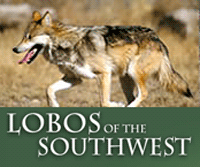Arizona Daily Sun (Original) Posted on December 11, 2014 by Emery Cowan
Michael Robinson has been monitoring Mexican wolf populations for years, tracking how they fluctuate and whether those fluctuations affect the number of fatal attacks on livestock each year.
The Center for Biological Diversity conservation advocate firmly believes rules for managing the federally protected wolves' recovery have been warped by political forces and riddled with loopholes for when wolves can be killed or removed from their habitat.
"It shows science is taking a backseat to the livestock industry's demands," Robinson said.
Now, Robinson and other conservation groups fighting for changes to federal Mexican wolf management policies appear to have more fuel for their arguments, thanks to a study published last week about wolf-livestock interactions. The long-range, multi-state study throws into doubt the effectiveness of killing wolves to prevent their impact on livestock. In fact, it concluded that strategy mostly does not work.
The findings are particularly timely as federal wildlife managers finalize a new environmental impact statement analyzing updates to rules for managing the Mexican wolf population. The proposed changes would include expanding the circumstances under which the wolves are allowed to be killed, relocated or returned to captivity. Those actions are all collectively called a "take."
The new rules have angered conservationists, who say the proposed rules will allow more killing of the threatened wolves. But federal and state officials say the regulations would add more checks and balances to the wolf management plan, make the rules less arbitrary and account for the social and biological complexity of the issue.
Questioning lethal control
Last week's study, published by researchers at Washington State University, found that an increase in wolves killed one year actually correlated to an increase in the number of livestock attacks recorded the next. The authors hypothesize that instead of effectively diminishing a livestock predators, killing wolves leads to pack instability, smaller pack sizes, an increase in breeding pairs and a higher propensity to target easier prey, like livestock.
Conservationists said the data support a point they have been hammering on for a long time.
"With this (study), it's the newest in a whole body of literature that tells this same story, that killing wolves for depredation doesn't really work," said Eva Sargent, Southwest program director with Defenders of Wildlife where she works with ranchers to implement nonlethal coexistence practices. "At best the impact of killing wolves on future (livestock attacks) is temporary or nonexistent."
Sargent explained that because wolves hunt more efficiently in packs, removing a member means they no longer have that cohesive unit, spurring them to look around for something easier to kill. Removing an older member of the pack also means that younger wolves lose a leader and a teacher, said Emily Renn executive director of the Grand Canyon Wolf Recovery Project. Without that authority figure, the juveniles become more problematic, Renn said.
A matter of scale
State and federal wildlife managers are of a differing opinion about the Washington State University research. They said the study's conclusions, while relevant on a broad scale, don't apply to more isolated scenarios. But they failed to agree on whether killing wolves to prevent livestock attacks is a hard and fast solution. Jim deVos, assistant director for wildlife management at the Arizona Game and Fish Department said the science is still undecided about the small-scale effectiveness of lethal control and it is very site specific.
A more definitive answer came from John Oakleaf, the U.S. Fish and Wildlife Service's field projects coordinator for the Mexican wolf.
"I think on a small scale it's pretty decided we can reduce depredations by killing wolves," Oakleaf said.
The expanded "take" provisions serve another goal as well, though. They were necessary to getting buy-in from people who have long opposed expanding the territory in which Mexican wolves could roam, deVos said.
"The department has steadfastly argued that social tolerance of the Mexican wolf program is key to the ultimate success of program," he said. "The take provisions in the (final environmental impact statement) we believe provide that balance between social acceptance and the biological need for wolves."





